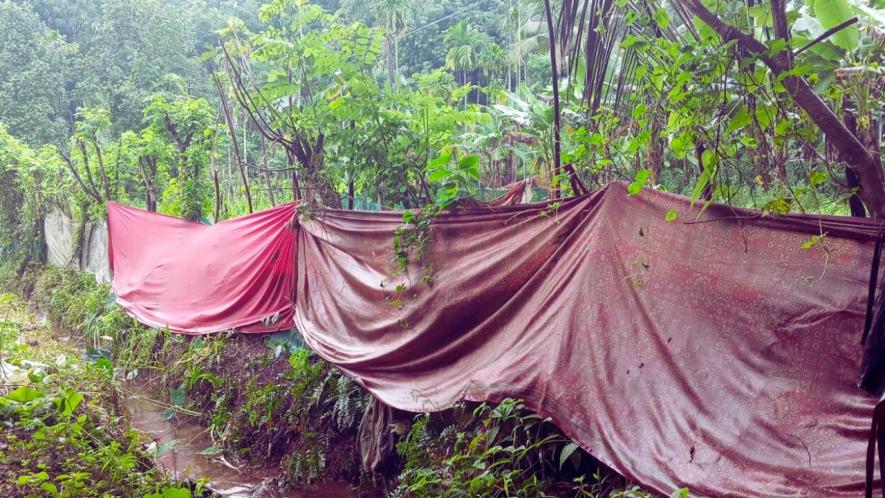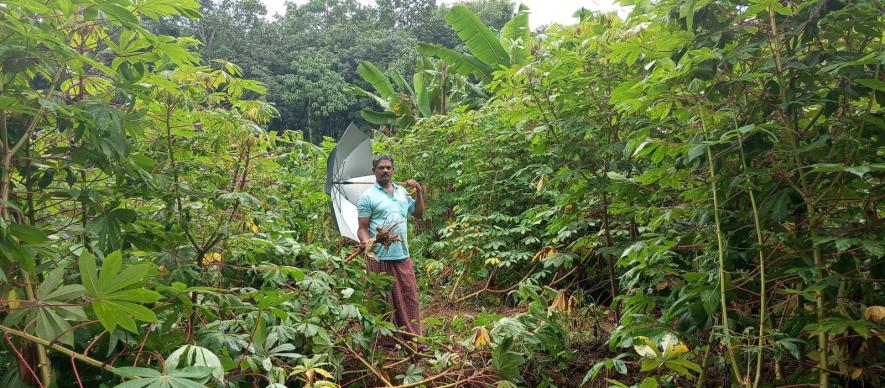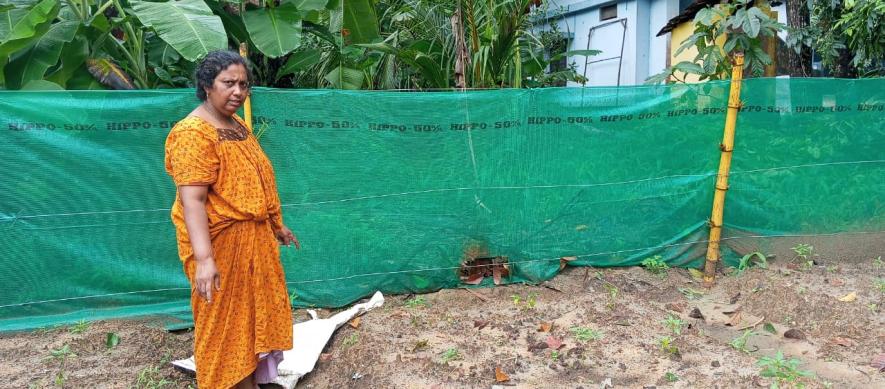Kerala: Federal Rights Key to Tackling Wild Boar Threat to Crops, Humans

Mallika's land
Last week, Pradeep Divakaran, a farmer from Aickadu village in Kerala, set out early in the morning on his usual walk to his paddy field where he had planted tapioca. He feared his cultivation could have been ravaged by wild boars, which have become an unrelenting menace in the state, especially in Pathanamthitta district. As a result, it has become a routine with farmers to patrol their farmlands each morning to assess the damage caused by these animals.
“I'm a small farmer with 20 cents of paddy field where I planted tapioca,” Pradeep said. “I knew that this would happen and I wouldn’t benefit from it. I spent Rs 7,000 to plant this crop, and it's only been three months now. Tapioca takes 9 to 10 months to mature and harvest. Some plants have survived, but wild boars keep coming and destroying the rest before they can mature,” he added.
In 2022, Pradeep leased 5 acres of paddy field to cultivate rice, but wild boar attacks damaged two acres of crop. “Since the compensation available wouldn’t cover my losses, I have not attempted to cultivate rice or lease a larger area for cultivation since then,” he said.

Pradeep with his damaged crops
Pradeep switched to cultivating colocasia, yam, banana, and other vegetables on his own land, which is only 20 cents. However, these crops are also eaten by wild boars, as a result of which he was forced to abandon their cultivation.
Mallika, a Samyojita Karshaka Award winning woman farmer, told this writer, “Chena Erisseri, a dish made from Elephant Foot Yam, is our district's specialty. We were known for cultivating a variety of yam, colocasia, banana and other crops. However, persistent wild boar attacks have forced us to stop growing these. Only farmers with strong boundary walls protecting their fields are now able to cultivate these crops.”
The impact of wild boar attacks is beyond immediate financial losses. The fear and uncertainty they create have disrupted the agricultural cycle, leading farmers like Pradeep and Mallika to hesitate in planting crops that attract these animals, despite these being their traditional cultivations.
This has resulted in a shortage of cropsm such as colocasia and elephant yam, leading to a spike in their prices. Yam is now selling for Rs 100 a kilogram, and colocasia at Rs 80-100/kg.
“At the end of the day, I'm a farmer, this is my primary source of income. I will have to cultivate something or the other,” both the farmers said.
To prevent wild boars from entering farmland and causing damage, the state forest department has implemented various initiatives. Apart from compensation for crop and life damage, the Kerala government has introduced subsidies for installing solar fences and other protective measures around farmlands.
This year, while Mallika’s paddy field was not directly harmed by wild boars, they did destroy her mud-built protective walls. Having suffered from wild boar attacks in previous years, she reached out to the panchayat officials to inquire about subsidies for solar fencing in her leased paddy field. She learned that while there is a 50% subsidy available for farmland, there is no subsidy for paddy fields.
Girija, another woman farmer, struggling with wild boar attacks, after losing her banana trees, decided to protect the 20 cents of leased land where she sowed chilli seeds. Although wild boars are not drawn to chilli plants, they pass through the land. Last week, the animals damaged one side of the green shade she had installed, which had cost her Rs 7,500. “I have already spent Rs 20,000 on this plot, including labour costs, to put everything together,” she told this writer.

Girija in her leased land
Girija also cultivates other crops, such as tapioca, banana and vegetables on her own land and leases additional land for farming. Due to non-availability of subsidies for solar fences on paddy fields, she feels that it is not worth investing in leased land that lasts only for one or two years.
Farmer Unions’ Demands
Farmers and their unions in Kerala had been demanding that wild boars be declared “vermin” and have sought permission to kill those animals who attack farmland or pose a threat to humans.
When an animal poses a threat to crops or human safety, it can be declared as ‘vermin’, thereby removing its protection from hunting as stipulated in Schedule II of the concerned Act.
Amidst the cries of farmers who have suffered due to wild boars causing 60% crop damage, the Kerala government has reached out repeatedly to the Central government.
It sought an amendment in the Wildlife Protection Act of 1972, which had long imposed restrictions on hunting wild animals, including wild boars. Since its inception, the Act has only recognised a few species, such as fruit bat, crows and rats as ‘vermin’.
Under Section 62 of the Wildlife Protection Act, any species, except those with the highest protection, like tigers and elephants, can be designated as ‘vermin’ in certain areas for specified periods, provided there are valid reasons. According to this Section, the Union government has the authority to declare any wild animal listed in Schedule II as ‘vermin’ for a specific duration and region.
Initially, state governments had the authority to declare species as ‘vermin’, but this power was transferred to the Centre in 1991. Therefore, Kerala sought to have wild boars classified as ‘vermin’ under Section 62 of the Act. This would have allowed both citizens and the state to cull the animals.
Additionally, Section 11 of the Act permits the Chief Wildlife Warden of a state to authorise the killing of any animal, regardless of its status in the schedules, if it poses a threat to human life.
Kerala proposed transferring this authority from the Chief Wildlife Warden to the Chief Conservators of Forests. The state argued that transferring this authority would simplify decision-making and enable faster responses to wildlife threats at the local level, especially in addressing the serious problems caused by wild boars.
Despite their repeated appeals to amend the Wildlife Protection Act of 1972 and to declare wild boars as ‘vermin’, these requests were met with consistent rejection from the Centre. Facing persistent denial, the Kerala government ultimately took action by issuing a forest directive in May 2022, which authorised the culling of wild boars encroaching on residential areas.
Sathi Devi, state committee member of All India Kisan Sabha, Kerala, said, “This decision came in response to the urgent pleas of farmers and farmers’ union who have pressured the state government to take action due to the ongoing threat posed by these animals. Regulations, however, mandated that wild boars could only be culled using licensed guns, with traps or poison strictly prohibited.”
Farmers can apply to the panchayat to request the removal of wild boars that invade their fields. Once these requests are verified, the panchayat president can approve them, and assign a shooter to handle the situation.
After the state authorised wild boar culling, Bharatiya Janata Party leader and a former Minister Maneka Gandhi, in May 2022, wrote to Kerala Forest Minister A.K Saseendran, urging the cancellation of the order, contending that it posed a risk to forest ecology and might worsen human-animal conflict.
Subsequently, in 2023, the Ministry of Environment, Forests, and Climate Change (MoEFCC) issued guidelines describing wild boars as “multi-specialty ecosystem engineers.” These guidelines highlighted the vital roles of wild boars in seed dispersal through their foraging, and as a prey for carnivores like tigers.
Sathi Devi contests this viewpoint, arguing that current forest and wildlife regulations are more concerned with managing human activities than with addressing the actual health of forests and wildlife. The wild boar population, which serves as prey for tigers, is also increasing, adding to the complexities of the wildlife and human conflicts.
Kerala’s tiger population has been growing since 2006, increasing from 46 tigers at that time to 190 by 2018. This rise in tiger numbers has heightened risks in areas like Wayanad district, where tigers have been known to attack humans and pose serious threats.
She also points out that her region, including her panchayat, falls outside the designated forest range and is predominantly an agrarian region, where they also have a state-owned plantation called the Kodumon Rubber Plantation. With approximately 5.51 lakh hectares of rubber cultivation and various other plantations, including coffee, tea, and other agricultural lands, she questions what the Centre means by claiming that wild boars, which serve as prey for carnivores like tigers, should not be classified as ‘vermin’. Does this mean they expect tigers to be brought into these plantations to address the wild boar crisis?
Rema Jayan, another woman farmer and recipient of the Samyojita Karshaka Award, who had rallied alongside farmers after experiencing continuous losses due to wild boar attacks, sought approval from the panchayat to cull the wild boars that had consistently damaged her crops and worsened her financial difficulties, after the state allowed local bodies to issue permission for culling.
But in her panchayat Kodumon, under which Aickadu village falls, there is only one licensed gunman available, and officials are searching for another. However, even if a gunman is available, there is no guarantee that wild boars will trespass the paddy field the same day. The decision to allow the culling of wild boars is not easy for farmers like her.
Rema expressed her frustration, stating, “We are tired of grieving over our losses and helplessness. What we need is autonomy to deal with these animals in a way that works for us. How are small farmers like us, who barely make ends meet, supposed to navigate the challenges of getting a license and buying a gun?”
The initial permission, which granted farmers the right to shoot wild boars, was extended in June 2023 for another year to ensure effective management of the wild boar population and safeguard agricultural lands and human lives.
“This permission is now approaching its deadline, yet we are still struggling. It is no longer about attacks on farmers or agricultural lands. During daylight, wild boars roam freely on the roads, causing accidents,” Sathi Devi added.
A couple of months ago, a local newspaper reporter who also delivered newspapers in the southern side of the village, was attacked by wild boars, resulting in severe injuries that required six surgeries and ongoing medical treatment. In 2020-21, wild boars caused eight human deaths, injured 146 people and resulted in 1,898 property damage incidents.
According to the Kerala Rules for Payment of Compensation to Victims of Wild Animals (1980), the Forest Department disbursed Rs. 130.10 crore in 2021-22 for those affected by wildlife attacks. Of the 8,076 applications received, 6,601 were for crop losses and property damage. A total of Rs. 500.20732 lakh was allocated to cover these damages.
The growing frequency of encounters between wild animals and humans had become an election issue during the 2024 Lok Sabha campaign, with farmers expressing their frustration and anger toward candidates and their representatives.
Farmers are increasingly becoming vocal about their grievances, demanding more effective solutions to manage conflicts and safeguard their livelihoods from the damage caused by wild boars. They argue that no one understands wildlife conservation better than the people who work on the land.
Rema said the Congress, which passed the controversial Wildlife Protection Act, also transferred the authority to declare certain animals as ‘vermin’ from state governments to the Centre in 1991. But, after facing the heat from farmers, it promised to support the farmers and address their concerns in Parliament. Rema now questions the Congress’s silence and seeks accountability for their commitment to resolving these issues.
As the situation continues to deteriorate, there is an urgent need for decisive action and meaningful reforms to protect both agricultural land and people from further damage. State-level measures alone are inadequate for protecting farmers from escalating wild boar attacks, highlighting the need for a more comprehensive and scientific approach.
The Central government could address this issue by reclassifying wild boar, currently listed under Schedule III of the Wild Life Protection Act, as ‘vermin’ in Schedule V. This reclassification would allow for their culling without legal repercussions and enable the consumption of their meat. While states, such as Uttarakhand, Bihar and Maharashtra have been granted the approval to classify wild boars as ‘vermin’, Kerala has been repeatedly denied the same authority, raising concerns about infringement of its federal rights.
The writer is an independent researcher based in Kerala.
Get the latest reports & analysis with people's perspective on Protests, movements & deep analytical videos, discussions of the current affairs in your Telegram app. Subscribe to NewsClick's Telegram channel & get Real-Time updates on stories, as they get published on our website.
























